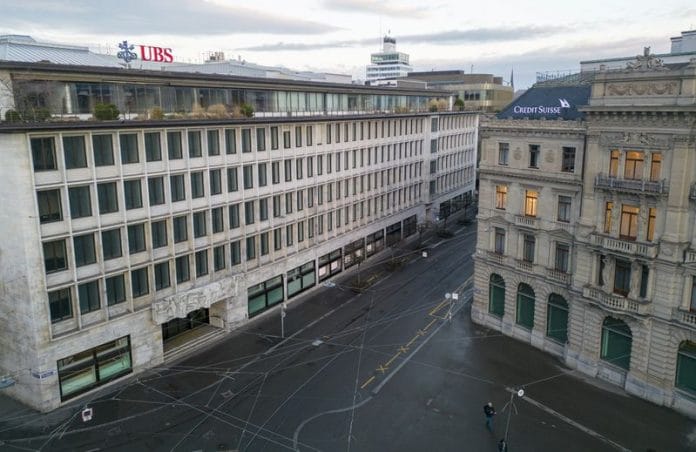By Amanda Cooper, Tom Westbrook and John Revill
(Reuters) – Banking stocks and bonds plummeted on Monday as the hit to investors from UBS Group’s state-backed takeover of Credit Suisse fanned concerns about the health of the global banking sector.
UBS shares fell by as much as 16% in early trade, their biggest one-day fall since 2008, amid concerns among investors about the long-term benefits of the deal and the outlook for banks in Switzerland, a country once seen a paragon of sound banking.
In a package engineered by Swiss regulators on Sunday, UBS Group AG will pay 3 billion Swiss francs ($3.23 billion) for 167-year-old Credit Suisse Group AG and assume up to $5.4 billion in losses.
Investor focus has now shifted to the massive blow some Credit Suisse bondholders will take under the UBS acquisition, which has added to anxiety about other key risks including contagion and the fragile state of U.S. regional banks.
European bank shares slumped, with an index of leading lenders down 5.8%. German banking giants Deutsche Bank and Commerzbank dropped 10.9% and 8.5% respectively, while France’s BNP Paribas fell 8.2%.
Those sharp moves followed a day of heavy selling in Asian financial markets as early investor optimism about official efforts to stem a banking crisis quickly evaporated.
“It should be clear that after more than a week into the banking panic, and two interventions organised by the authorities, this problem is not going away. Quite the contrary, it has gone global,” said Mike O’Rourke, chief market strategist, Jones Trading.
Credit Suisse shares slumped 62%, reflecting the huge loss its shareholders will see in their investment in the bank.
Under the deal, the Swiss regulator decided that Credit Suisse’s additional tier-1 bonds – or AT1 bonds – with a notional value of $17 billion will be valued at zero, angering some of the holders of the debt who thought they would be better protected than shareholders in the takeover deal announced on Sunday.
Credit Suisse’s Additional Tier 1 bonds dropped sharply in early European trade with a number of dollar-denominated issues bid at 2 cents on the dollar, Tradeweb data showed.
CO-ORDINATED ACTION
The fresh tumble in bank shares comes as investors shrugged off promises by top central banks over the weekend to provide dollar liquidity to stabilise the financial system.
In a global response not seen since the height of the pandemic, the U.S. Federal Reserve said it had joined central banks in Canada, England, Japan, the EU and Switzerland in a co-ordinated action to enhance market liquidity.
The European Central Bank vowed to support euro zone banks with loans if needed, adding the rescue of Credit Suisse was “instrumental” in restoring calm.
The banking sector lurched into crisis earlier in March with failure of U.S. lenders Silicon Valley Bank and Signature Bank before ensnaring its biggest name yet in Credit Suisse.
Problems remain in the U.S. banking sector, where shares are still under pressure despite a move by several large banks to deposit $30 billion into First Republic Bank, another institution rocked by the failures of Silicon Valley and Signature Bank.
On Sunday, First Republic saw its credit ratings downgraded deeper into junk status by S&P Global, which said the deposit infusion may not solve its liquidity problems, and its shares fell 22% in premarket dealing on Monday.
QUESTIONS FOR UBS
The shotgun Swiss banking marriage is backed by a massive government guarantee, helping prevent what would have been one of the largest banking collapses since the fall of Lehman Brothers in 2008.
The deal will also make UBS Switzerland’s only global bank and the Swiss economy more dependent on a single lender.
“The Credit Suisse debacle will have serious ramifications for other Swiss financial institutions. A country-wide reputation with prudent financial management, sound regulatory oversight, and, frankly, for being somewhat dour and boring regarding investments, has been wiped away,” said Octavio Marenzi, CEO of Opimas, in Vienna.
On Monday, Credit Suisse’s banking operations appeared to be business as usual at its major offices in Asia.
Monetary authorities in Singapore and Hong Kong, where Credit Suisse hosts large regional offices, separately said the Swiss bank’s business continued without interruption.
And Credit Suisse urged its staff to go to work, according to a memo to staff seen by Reuters.
In a separate memo, the bank said as part of the takeover if job cuts proved necessary it would be communicated to staff as per guidelines. The bank will also pay bonuses as communicated before and as per schedule, the memo added.
Credit Suisse staff arriving to work in Hong Kong and Singapore on Monday morning, however, fretted about retrenchments and retaining business.
UBS CEO Ralph Hamers said there were still many details to be worked through.
“I know that there must be still questions that we have not been able to answer,” he said. “And I understand that and I even want to apologise for it.”
($1 = 0.9280 Swiss francs)
(Reporting by Stefania Spezzati, Oliver Hirt and John O’Donnell in Zurich; Additional reporting by Lananh Nguyen, Saeed Azhar, Hannah Langby, Julie Zhu, Karin Strohecker and Reuters bureaus; Writing by Sam Holmes and Toby Chopra; Editing by Muralikumar Anantharaman, Kirsten Donovan)
Disclaimer: This report is auto generated from the Reuters news service. ThePrint holds no responsibilty for its content.






